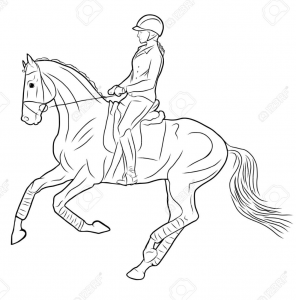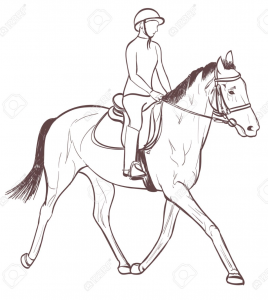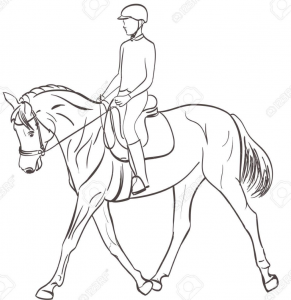Editor’s Note: Best Horse Practices Summit presenter Katrin Silva grew up riding dressage in Germany before moving to the United States at age 19 to learn to ride Western. She’s been riding both disciplines for the last 20 years and is a regular guest columnist for Cayuse Communications. The author of Dressage for All of Us: How to Help Any Horse Become a Happier, More Responsive Riding Partner lives in New Mexico where she works with dressage and Western clients. Visit her blog here.
Katrin writes:
How we talk to and about our horses is important. This is especially true when things don’t go as planned: when training sessions turn into arguments, when horses spook, bolt or buck, or when the expensive clinic you’ve spent months preparing for leaves your horse an anxious mess instead of helping him find confidence. In those situations, harsh language may come easily. I know horses can’t understand our words in a literal sense, but what we say around them still matters.
 Here are a few examples why:
Here are a few examples why:
Abusive language
Over the years, I’ve heard frustrated trainers, riders, and farriers call horses all sorts of names: Stubborn A$$hole, Piece of s##t, F##kface, and other colorful appellations I don’t want to repeat here. I’ve also heard the argument that words don’t hurt horses, since horses don’t know what they mean. But I don’t buy it. Horses may not get the exact significance of every insult hurled in their direction, but they are sensitive creatures. They dislike loud voices. They understand the tone and body language of angry people, which can make them tense and apprehensive. Plus, verbal abuse opens the door to physical abuse. Just like derogatory terms for people dehumanize them, derogatory terms for horses make rough treatment seem appropriate and justified. Abusive behavior is a slippery slope that often begins with words. The barn is no place for yelling, name-calling, or any sort of disrespectful language – directed from anyone toward anyone else, horse or human. Let’s not go there. Ever.
Generalizing language
Thank goodness, stereotyping is less acceptable than it used to be when it comes to talking about people, but the horse world is still full of sweeping, mostly negative generalizations about certain breeds or kinds of horses. I’ve lost count of how often I hear phrases like “All chestnut mares are moody!” or “All Arabians are crazy!” or “Quarter Horses just have no talent for dressage!” Such statements are not only unfair and unkind, they are also an easy way to avoid the long, complicated process of finding the reasons behind why a horse may act the way he acts. Most stereotypes about horses contain a kernel of truth somewhere, because we have bred horses over hundreds of years to move a certain way or to be good at certain jobs. That said, the kernel is never more than a tiny grain, and individual horses are still individuals, each with their own conformation, personality, and history. Yes, many Arabians are tense and anxious, but that’s not because they’re Arabians. One Arabian may suffer from a sore back, another may have behavioral issues from an unbalanced or impatient rider. Arabians do tend to be sensitive, but that’s not a bad thing in and of itself. It just means that their humans need to be extra calm. And many Arabians are perfectly even-tempered to begin with, but because of the negative stereotypes floating around they never get a fair chance from people looking for a nice, quiet horse. Let’s try to do better.
 Blaming language
Blaming language
Blaming the horse for behavior we don’t want is more subtle than cursing or stereotyping, but it’s still unconstructive. Blaming language keeps us from developing the relationship we want with our horses because it allows us to avoid looking at our own role in creating or encouraging such behavior. Phrases like “He tried to buck me off!” or “He refuses to come on the bit!” make horses sound like they spend their spare time plotting personal attacks against their humans. Horses don’t operate like that. We can describe behavior we’d like to change in a way that encourages solutions, instead of blaming the horse. We can reframe the situation by describing it in neutral terms that don’t automatically assign a guilty party: “He braces against the bit and hollows his back. Maybe that’s because I’m not soft enough with my hands. Maybe he needs to see a chiropractor. Maybe I am using the wrong bit. How can we help him understand he doesn’t need to do this? Let’s look for a better way!”
 The ability to verbalize what we feel and think is a talent unique to humans. Language is our most powerful tool for engaging with the world around us. We can use words to improve our relationship with horses rather than damage it. The choice is ours. Let’s choose respectful, kind, constructive words when we talk to our horses, or about our horses. They may not understand the exact meaning of what we say, but they do get the gist of it.
The ability to verbalize what we feel and think is a talent unique to humans. Language is our most powerful tool for engaging with the world around us. We can use words to improve our relationship with horses rather than damage it. The choice is ours. Let’s choose respectful, kind, constructive words when we talk to our horses, or about our horses. They may not understand the exact meaning of what we say, but they do get the gist of it.
Maddy, you are amazing!
The timing of Ms Silva’s words and your printing and disseminating them is so appreciated.
Thank you for what you do and do so well.
Carrie
Yes yes yes! I get so upset hearing people bad mouthing their horses and never looking in the mirror for some answers to their problems! Thank you for your wise words.